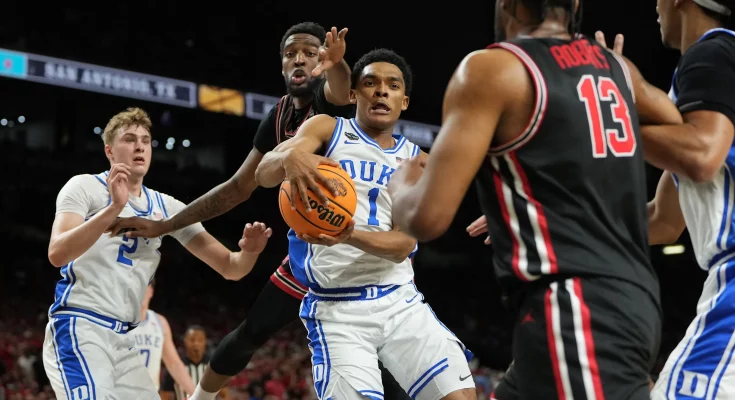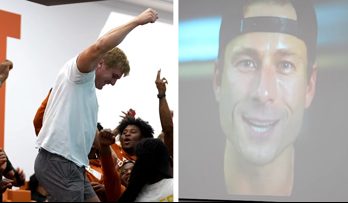Jon Scheyer’s pride in Caleb Foster radiates far beyond the hardwood of Cameron Indoor Stadium. As Duke basketball continues to evolve under Scheyer’s stewardship, the commitment and maturity displayed by Foster has stood out as a defining example of what the program aims to represent in this new era. With the ever-shifting landscape of college basketball—accelerated by the transfer portal, NIL deals, and players chasing instant stardom—the decision by a former five-star guard like Foster to remain rooted in Durham speaks volumes. Not just about the player, but about the culture Jon Scheyer is carefully building at Duke. In a time when patience is rare and loyalty even rarer, Foster’s choice to “stay the course” as Scheyer put it, isn’t just a footnote. It’s a headline act in the story of Duke Basketball’s present and future.
Foster, who arrived at Duke with much fanfare, didn’t see the court time or the spotlight many expected in his freshman year. Highly touted out of high school and projected by some to be a one-and-done talent, Foster instead had to navigate a season of growth behind more seasoned players. He faced the reality of competing in one of the deepest and most scrutinized programs in the nation. Rather than expressing discontent or entering the transfer portal like so many in his position might have, Foster chose resolve. He chose development. He chose Duke. That type of decision is exactly what makes Jon Scheyer beam when talking about Foster’s role moving forward.
Scheyer, who took over for the legendary Mike Krzyzewski, has had the monumental task of not just continuing a winning tradition, but doing so while redefining it in a rapidly changing environment. Recruiting remains critical, but retention may now be equally so. Players who believe in the long game, who value staying within the system and growing organically, are harder to find. And that’s why Foster’s decision carries so much weight. According to Scheyer, Foster didn’t need convincing. He didn’t weigh his options publicly or shop around. Instead, he locked in on what he came to Duke for in the first place: excellence, challenge, and the opportunity to eventually lead. That mindset, Scheyer notes, is invaluable in the current college hoops climate.
Foster’s sophomore campaign will offer him a chance to take on a far greater role. The backcourt will need leadership, poise, and production, all of which Foster is now expected to bring. Having spent a year learning the system, absorbing the nuances of high-level basketball, and watching his teammates closely, he’s poised to step into the kind of position that rewards both patience and preparation. Duke has added talent, as always, but it’s the internal growth of players like Foster that provides the glue for long-term success. Scheyer sees Foster not just as a key contributor on the court but as a cultural cornerstone—a player who believes in the ethos of the program and mirrors the values being preached from the coaching staff.
What makes Foster’s commitment even more commendable is that he entered Duke with every reason to expect instant success. Coming from a high-profile high school career, with scouts and fans hyping his NBA potential early on, he could have easily bought into the now-or-never narrative that swirls around top recruits. When the minutes didn’t come as expected, when others stole headlines and racked up stats, Foster didn’t pout or push for a change. He accepted the process. That rare maturity, especially for a teenager in the social media age, earned him admiration from the staff and trust from his teammates. And now, he’s reaping the rewards—not just in opportunity, but in the leadership expectations being handed to him by Scheyer.
Scheyer has made it clear that Duke’s future isn’t just about the top-tier freshmen who walk through the door each year—it’s about building a sustainable winning culture. That means cultivating players who stay, learn, lead, and leave a lasting impact. Foster’s journey embodies that philosophy. Rather than being a one-year contributor, he’s positioning himself to be a multi-year Duke player whose legacy is built not on hype, but on resilience and growth. In many ways, his story serves as a counter-narrative to the typical arc of high-profile recruits in the NIL and portal era. And that’s precisely why Scheyer has gone out of his way to spotlight Foster’s attitude and trajectory.
Beyond what Foster brings to the table in terms of skill—his smooth shooting, high IQ, and underrated defensive instincts—what truly sets him apart is his character. Scheyer noted in recent remarks that Foster has been one of the most coachable players on the roster. That, in and of itself, is a significant compliment in today’s game, where ego can sometimes outpace effort. Foster’s willingness to listen, to take feedback, and to stay hungry through adversity, has made him an essential voice in the locker room. Younger players coming in will look to him not just for on-court guidance but for how to carry oneself in a high-pressure program. That leadership, though intangible, is perhaps the most critical component of Duke’s foundation under Scheyer.
It’s also worth noting that Foster’s path might actually end up benefitting his long-term career more than if he had left early. The NBA is full of cautionary tales—players who jumped too soon, lacked polish, or didn’t have the right support system in place. Foster, by staying and developing at Duke, is positioning himself not just to be drafted, but to stick in the league. Scheyer’s system emphasizes team play, attention to detail, and basketball IQ—all attributes that pro teams love. A more seasoned Foster, who’s had the chance to lead, face adversity, and refine his game against elite competition, is a far more attractive long-term investment for NBA teams. In that sense, Foster’s decision may very well extend his career by a decade or more.
Duke fans, too, have responded positively to Foster’s loyalty. In a program that has seen its fair share of player turnover in recent years, Foster represents stability and commitment. That resonates with a fanbase that, while always excited by new five-star talent, longs for players who truly connect with the program and its values. As the 2025–26 season approaches, the Cameron Crazies are likely to rally around Foster in a special way. He’s not just another name on the roster; he’s a returning presence, a story of perseverance, and a beacon for what the program hopes to cultivate in future players.
Scheyer, ever intentional in his praise, didn’t just commend Foster out of routine. His comments were filled with genuine pride, not just in the player Foster is becoming, but in the message his presence sends. For recruits watching from afar, for parents seeking a place that fosters both development and loyalty, and for the college basketball world as a whole, Foster’s story is a reminder that success isn’t always immediate—and that sometimes, the smartest move is simply staying the course. Foster’s decision and demeanor align with the long-view approach that Scheyer is trying to normalize at Duke, something that could end up being one of his greatest coaching achievements if sustained.
In the months to come, much will be expected of Foster. He’ll be counted on to score, facilitate, defend, and lead both vocally and by example. But with a year of lessons behind him and a coach fully invested in his development, he’s more than ready for the challenge. For Duke, having a returning guard with his combination of talent and experience offers a rare luxury in a college landscape increasingly marked by roster turnover. And for Scheyer, Foster’s path validates the faith he places in player development and program culture.
Ultimately, Caleb Foster’s story is still being written. But the early chapters are rich with meaning. He came in with star billing, endured a quieter freshman campaign, and instead of running from the moment, he embraced it. Now, as he gears up to play a central role for one of college basketball’s most iconic programs, he carries with him not just the lessons of the past year, but the trust of his coach and the admiration of those who understand how rare his journey truly is. Scheyer’s pride is more than warranted—it’s a reflection of the type of program he’s trying to build, and the kind of player who makes that vision possible.



